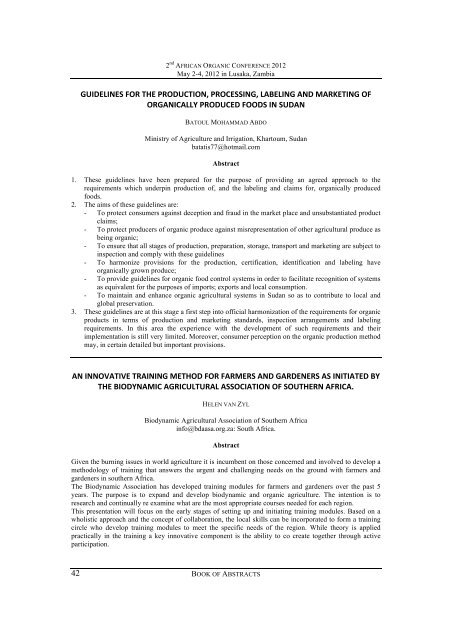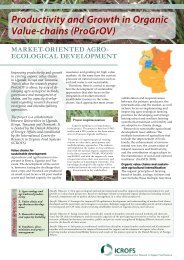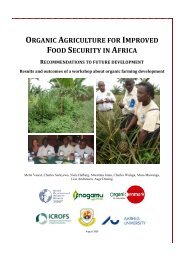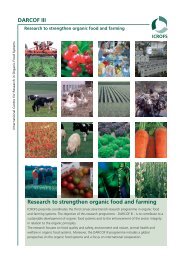The 2nd African Organic Conference â Mainstreaming ... - ICROFS
The 2nd African Organic Conference â Mainstreaming ... - ICROFS
The 2nd African Organic Conference â Mainstreaming ... - ICROFS
You also want an ePaper? Increase the reach of your titles
YUMPU automatically turns print PDFs into web optimized ePapers that Google loves.
2 nd AFRICAN ORGANIC CONFERENCE 2012<br />
May 2-4, 2012 in Lusaka, Zambia<br />
GUIDELINES&FOR&THE&PRODUCTION,&PROCESSING,&LABELING&AND&MARKETING&OF&<br />
ORGANICALLY&PRODUCED&FOODS&IN&SUDAN&<br />
BATOUL MOHAMMAD ABDO<br />
Ministry of Agriculture and Irrigation, Khartoum, Sudan<br />
batatis77@hotmail.com<br />
Abstract<br />
1. <strong>The</strong>se guidelines have been prepared for the purpose of providing an agreed approach to the<br />
requirements which underpin production of, and the labeling and claims for, organically produced<br />
foods.<br />
2. <strong>The</strong> aims of these guidelines are:<br />
- To protect consumers against deception and fraud in the market place and unsubstantiated product<br />
claims;<br />
- To protect producers of organic produce against misrepresentation of other agricultural produce as<br />
being organic;<br />
- To ensure that all stages of production, preparation, storage, transport and marketing are subject to<br />
inspection and comply with these guidelines<br />
- To harmonize provisions for the production, certification, identification and labeling have<br />
organically grown produce;<br />
- To provide guidelines for organic food control systems in order to facilitate recognition of systems<br />
as equivalent for the purposes of imports; exports and local consumption.<br />
- To maintain and enhance organic agricultural systems in Sudan so as to contribute to local and<br />
global preservation.<br />
3. <strong>The</strong>se guidelines are at this stage a first step into official harmonization of the requirements for organic<br />
products in terms of production and marketing standards, inspection arrangements and labeling<br />
requirements. In this area the experience with the development of such requirements and their<br />
implementation is still very limited. Moreover, consumer perception on the organic production method<br />
may, in certain detailed but important provisions.<br />
AN&INNOVATIVE&TRAINING&METHOD&FOR&FARMERS&AND&GARDENERS&AS&INITIATED&BY&<br />
THE&BIODYNAMIC&AGRICULTURAL&ASSOCIATION&OF&SOUTHERN&AFRICA.&<br />
HELEN VAN ZYL<br />
Biodynamic Agricultural Association of Southern Africa<br />
info@bdaasa.org.za: South Africa.<br />
Abstract<br />
Given the burning issues in world agriculture it is incumbent on those concerned and involved to develop a<br />
methodology of training that answers the urgent and challenging needs on the ground with farmers and<br />
gardeners in southern Africa.<br />
<strong>The</strong> Biodynamic Association has developed training modules for farmers and gardeners over the past 5<br />
years. <strong>The</strong> purpose is to expand and develop biodynamic and organic agriculture. <strong>The</strong> intention is to<br />
research and continually re examine what are the most appropriate courses needed for each region.<br />
This presentation will focus on the early stages of setting up and initiating training modules. Based on a<br />
wholistic approach and the concept of collaboration, the local skills can be incorporated to form a training<br />
circle who develop training modules to meet the specific needs of the region. While theory is applied<br />
practically in the training a key innovative component is the ability to co create together through active<br />
participation.<br />
42<br />
BOOK OF ABSTRACTS





